- Home
- Tessa Gratton
The Blood Keeper Page 7
The Blood Keeper Read online
Page 7
When you took me into town to purchase stockpiles of feed for the chickens, I became Gabriel’s niece, because he looked almost old enough for it. I suggested buying up all the late autumn fruit we could find, because I knew how to can it so that we’d have sweets for Christmas. “You’ll be indispensable,” Gabriel said, fingers pressing into my shoulder as he hugged me against his side at the grocer’s.
I used the last of my money to buy a wool dress and sweaters, as well as a strong pair of boots. Things more suited to a farm than my pleated skirts and ankle shoes. Gabriel insisted on a pair of seed pearls for my ears, and when I demurred, he said loudly enough for others to hear, “Let me spoil my poor niece in her time of tragedy.” I was trapped and gave in.
It was you I watched, always, for cues. I paid attention to the men you spoke with for more than two words, and was sure to introduce myself to their wives. You tended toward the simpler men, the farmers, while Gabriel haunted those with watches in their pockets and thoughts on the latest movies.
At times I could not understand how you and he shared a life. You seemed so different from his brazen ways. Voice quiet, eyes steady, hands reaching out only when you knew what you wanted. Gabriel laughed and shouted greetings to those he knew, touched everything, flitted about like a boy—or like a king. You both seduced the town—he with charm, and you with certainty.
But one afternoon that first week, I stomped down toward the barn to ask one of you to kill me a chicken because it was about time I learned to use the old iron oven. And there the two of you stood in the meadow beside the barn, facing one another. Both of you shirtless despite the cold, slate sky above. You focused intensely on each other, hands forward and palms out but not quite touching.
There I saw Gabriel’s tattoos: magical patterns of intricate stars-within-stars ranging from his neck down his back and chest, swirling around his arms. Some were gray and old, others sharply black and red, completely new. They layered over each other as though he’d had different sets done and redone every few decades of a very long life. It was my first clue that you were both older than you seemed.
And you, you took my breath away. Your skin was pale from the elbows up to your collarbone, and pink from the cold. Long muscles shifted with every motion, and I put my fingers to my lips because I wanted to touch you, to discover if you were hot or cold, smooth or rough. My whole body flushed, and just then the two of you opened your mouths and said, Bind.
Magic leapt from the earth, snapping through me and all the air. I swayed with the immensity of it, reached out and gripped a tree to remain standing.
The hill trembled and all the forest danced. The burn of magic swept around, tingling under my skin.
It settled down, sudden and fast as hail. My ears popped. Gabriel grasped your hand and tilted his head to the sky with a wide-open laugh.
You closed your eyes and shuddered so violently I saw it from my distance. The land was bound with your magic, safe and secure from—I did not know. Anything? Everything? The overwhelming sense of security made me smile.
Until I realized that a great spell had just been performed, yet neither one of you had spilled any blood. You two were connected in ways more intimate than magic, and together your power dimmed the sun.
ELEVEN
MAB
On the third morning Pan woke up in Arthur’s bed, I waited on the threshold. He’d had three days to sort us out, to decide if he could trust me, to learn the dialect of our trees. I hadn’t asked him any questions about his past, about his magic or his father. I had only let him be a boy in a new house, eating and drinking and sleeping, touching all the walls and getting his feet under him. Nor had he volunteered much.
But last night, Donna had tucked him in and come slowly back down the stairs. “Those burns on his hands are self-inflicted” was all she said to me, her eyes focused on the wallpaper over my shoulder.
“I’ll take him with me for the seven-day binding in the morning,” I said.
And so I did. “When you’re ready,” I said to him as he stretched out of the roll of blankets stuffed at the foot of the bed, “come outside. I want to show you what we do here.”
He came out with a bag of frozen blackberries, wearing only a thin boy’s T-shirt and a pair of drawstring pants I’d hemmed Monday evening. He looked at my bare feet and wiggled his toes in the grass. “Donna said the crows like these berries best,” he told me, scanning the gray sky for the birds.
“She was right.” I held out one hand and he took it. Together we plunged into the forest, making our way down the northwestern face of the hill to the Child Creek. Overhead, rippling gray clouds hid the morning sun, keeping the shadows down and all the forest quiet with anticipation.
We walked along the banks of the creek, both of us splashing into the water and hopping on smooth river rocks. I tore open his bag of frozen berries, and Pan dropped them behind us. After a few moments, the crows appeared, darting down out of the sky to snatch up the frozen treats. They argued and laughed loudly, batting at each other and making Pan grin.
When the berries were gone, we’d just come around a curve of land, and the western meadow spread out before us in shades of pink and purple. Under such a steel sky, the colors shone harder and bolder. These were some of my favorite days. I said, “Every week I make my way all around our land, to rebind the magic, to keep down the curses that have been planted here over the decades. To reintroduce myself to the trees.”
Pan didn’t respond, but I could tell by the way his hands went still that he was listening.
“Did anyone ever mention to you the Deacon?” I asked.
Pan paused, staring out at the phlox and violets, the morning glories and wild columbine. He reached down and plucked a cluster of pink vervain. Turning, he offered it to me. “The blood keeper, is what Dad called ya.”
With a smile, I accepted the flower, glad he’d decided to engage. “Yes, exactly. And that is what I want to show you. If you’d like to see?”
“Yes,” he said, eagerly.
We continued north, the crows flying peacefully overhead, and followed the Child Creek to where it met the Mighty Creek and formed an arrow of land. A line of honey locust trees closed off the triangle, making it a natural place for protection and binding magic. A twisted old oak tree spread low, thick branches from the center, and all around it the ground tingled with power. One by one, the crows landed in its upper branches, folding their wings in and nestling down.
“This is the blood ground, Pan.” I stepped barefoot onto the earth. Little grass grew here, and the oak roots wove up and down, like a netting to keep the blood ground tied together. I found one, stepped up onto it, and held out my hand to invite Pan up as well. “It’s where we bury curses and chaotic magic too dangerous to be loose.”
Pan jerked free of me.
“Oh no.” My heart kicked, and I barely managed not to grab him. “No, Pan, you aren’t a dangerous curse, no matter what happened to you. I didn’t mean that at all.”
He backed warily to stand in the creek, using the flowing water as a barrier. “Then what?”
“I want to show you what I do, so that you know I can help you. That you’re safe here, because we don’t do bad things. We keep in—in harmony with nature. With God.”
“My dad says our magic is from the devil, and God doesn’t care.”
I tried to think of what I’d want to hear in his position but wasn’t certain; I’d always been loved and told I was special and strong and part of God. I balanced on the root of the oak tree, walking toward the trunk. There, I placed my hand against the rough gouges of bark. “Pan, God is everything beautiful; that’s what my father used to tell me. And sometimes that beauty hurts, sometimes it overwhelms us, but it’s always magic.”
“Was your dad the blood keeper before you?”
“Yes.” I let my eyes flicker shut for a moment. “He wasn’t my birth father, but he might as well have been.” I’d always wished it was so.
&n
bsp; Pan walked through the creek nearer to me but stayed so that the water ran around his ankles. He was a small golden thing amid all the green and gray, with his autumn-oak-leaf skin and copper-dark hair. Like he’d grown up out of the forest. I felt so clearly in my bones that he belonged here, I didn’t say anything. He’d believe me. He’d understand this was where he needed to be, too. After a long moment watching, he said, “Show me.”
Allowing myself a smile, I went out to the line of honey locust trees and pressed my palm into a bundle of thorns. Some of the spikes were as long as my hand, clustered in angry bunches up the trunks. The sharp points cut into my skin in five places. Cupping my hand, I began a circuit of the blood ground. Blood gathered in my palm, and when I completed my circle I let five drops fall.
Three times I circled the ground, three times I dripped my blood into the earth. Magic teased at my feet as I walked, and I sang a song about safety and peace. When the last drop fell at the end of my final circle, the ground trembled. I walked straight to the oak tree and pressed my hand against it. “Bound through seven nights and seven days,” I said.
My hand flared hot, burning against the rough bark. I took it back and wiped the streaks of excess blood off into my hair. Now my skin was whole, though pink and tender. I walked straight into the Child Creek near Pan, letting the cold water run around my ankles. The stream pulled all the dirt and loose grasses from my toes, its natural magic cleansing me of the blood ground.
“Now we walk the land,” I said, my voice low and full of vibrant magic.
Following the flow of the water, together we made our way in a mile-wide circle around all the land. I stopped six times, resetting boundary magic and wards to bind our land back into itself. To remind it again who I was, what it was.
Pan did not interrupt the whole time, only watching me with his bright eyes, or waving at the crows that hopped along branches beside us or flew circles overhead when I set down magic. They echoed the patterns of my runes, and I think Pan could see it, too.
Nick had called him a kid, and I supposed being only ten years old made him so, but I remembered being that young, being enamored of the tingling feel of the seven-day binding. I hoped Pan was falling in love with it as I had. That whatever he’d known before paled and shrank in comparison to this here.
When the binding was done, my fingernails pulsed with my heartbeat, and so did the clouds in the sky. In streaks of sunlight, motes of dust bobbed at the same pace as my blood. I laughed at the crows teasing each other and put a hand against the smooth white bark of a gumball tree. It tickled my palm, and I heard the forest hissing my name as wind rushed all around us.
Pan held out his hands, fingers splayed, as if he might catch it. “How did that feel?” I asked him.
He shook his head as if words failed but suddenly fisted his hands, grasping the tendrils of wind. “I liked it.”
I waited.
“The trees did, too,” he said, crouching and touching a silver-barked birch. “They’re whispering your name.” His smile faded and he set his forehead against the trunk. “But they don’t like it when I touch them.”
Stepping softly, I went to Pan and put both of my hands on his back, just between his shoulder blades, where his wings would grow if he had them. “We can change that.”
“It’s my blood.”
“Let me try.”
He shivered and turned around, sinking down to curl against the birch tree, arms around his knees. “My mama called me Lukas,” he said so softly I had to lean in.
I held out my hands, palms up, so that he could see the star tattoo on my left wrist and the snaking spiral on my right. “I swear to you, Lukas, I’ll make it so the only magic marked on your skin is the kind you want there.”
Hesitating only a moment, he reached out and grasped my hands with his.
WILL
I came home on Wednesday after practice to find a shiny new soccer ball in camo colors sitting on my pillow.
Ben.
I’d ignored him for the whole twenty-four hours since our fight. Monday evening at dinner, it had dawned on me that Dad was being his usual quiet and reserved self. So Ben must not have said anything to him regarding our little discussion about the Naval Academy. Half of me was grateful. The other half wanted to yell it at Dad myself, because Ben sure didn’t owe me any kind of filial loyalty over his duty to tell Dad what a screwup and traitor to family tradition I was.
I dropped my backpack on the floor and palmed the ball. As peace offerings went, this was a little backhanded. But there’d been a time I’d gotten a kick out of playing with him. Running for my life, choking on laughter as he chased me across a flat field of grass. That must’ve been in Maryland, where we’d lived when I was about five. He’d always catch me and grab one arm and one leg and then spin around, flinging my body into the air and yelling these high-pitched war cries. We’d spin and spin until I thought I’d puke. Ben shouldn’t have been strong enough, but I was never afraid. And Aaron, who’d been six in Maryland, had been just too big. That made it our game, mine and Ben’s. He used to tell me I was the stealth bomber, so I had to be silent while he swung me or the enemy would know we were coming. But I could never be quiet.
He’d left when I was only ten, off to fulfill his part of the Sanger destiny. Same destiny Aaron had followed to his death. The one I couldn’t force myself into.
I sighed loudly, and instead of showering took Ben’s ball out to the backyard. I fed and watered the girls, but they knew what a soccer ball meant and totally ignored the kibble. Dribbling the ball lightly on my own, I got them to chase me across the yard. They took turns darting in to trip me, and I worked hard to stay on my toes. I laughed as I danced around them, and Val made her little barks that always sounded like she was laughing with me. Havoc slipped between my feet—she had the winning ratio of success compared to Val—and I fumbled, going down hard enough that my chest contracted where that faded bruise still hung on. I spread out with my face to the sky, laughing, as both dogs swarmed me, licking my face.
“We could use her on the front lines,” Ben said, coming up so that his shadow blocked the late-afternoon sun. I squinted at him as Valkyrie leapt up and put her front paws on his stomach.
He gently shoved her off and held a hand down to me. I took it, and he hauled me to my feet.
“Thanks,” I said, hoping he knew I meant for the ball, too.
“Sure. Mom gave me this today.” Out of his jeans pocket he pulled a folded-up newspaper article.
I groaned.
It was the special insert the local paper had run last month after the earthquake. With a picture of me from last season’s soccer team and Holly in her cheer uniform.
The interviewer had come to dinner at the house. Mom made pork chops and Dad gave me his favorite tie to wear, then I had to answer questions like What were you thinking when you dove into the water, William? which was like asking what I thought when I poured my cereal this morning: Nothing. It’s just what you do.
That answer made the reporter downright gleeful, and she called me “Will Sanger—Homegrown Hero” in her article. Like I was a vegetable.
That was when the guys on the soccer team began calling me Hero when I passed in the hall at school, and my locker was plastered with copies of the interview. I don’t know who decided to hand around Superman stickers to slap on my back when I wasn’t looking, and I wouldn’t have thought any of my friends were smart enough to think of a plastic laurel crown. And yet there it was, waiting on my assigned desk in History.
Mom and Dad were the only ones who pretty much took my so-called heroism for granted. Like they knew who I was, so what I’d done hadn’t surprised them. I stared at Ben now, and braced myself. I had no clue how he was going to react.
“Strong work, Will,” he said.
I let my hands fall to my sides. And shrugged. “It wasn’t …” I didn’t know how to explain that I knew it was important but that it also hadn’t been a big deal.
“I get it.” A small smile pulled at his mouth as he tucked the article back into his pocket. “Proof that heroism is in your blood.”
“Oh God.” I backed away and bent to grab up the soccer ball. “I see where this is going.” I told Havoc and Val to go eat their damn dinner.
“I’m not kidding,” Ben said, dodging the dogs as they ran around him toward the kennel. “You might be in denial, but your actions speak more loudly. Admit it.”
I bounced the ball onto one knee and focused on keeping it in the air with only my knees. It took rhythm and balance and concentration for it not to go flailing off. Ben jumped around and snatched it.
“I get that you’re scared after what happened to Aaron. I do. But you can’t let it dictate what you do with your life.”
“That isn’t it.”
“Then what?”
“I don’t … know.” It was hard to meet his skeptical eyes. “I just don’t want it.”
“You used to.” Ben said it with total certainty. And was right.
“I don’t anymore.” I focused on the camouflage ball under his arm.
“Because of Aaron.”
“I guess.” I thought of that moment in the kitchen last year, when it got so quiet and Mom said, Yes, this is Mrs. Sanger, then dropped the phone. When we turned on all the TVs and the radio just to make the quiet go away. Ben hadn’t been there for that. He couldn’t understand. I couldn’t explain.
He shrugged with fake casualness. “It sounds like fear to me, and I don’t believe you’re a coward. Not my brother.”
I ground my teeth, and turned the grimace into a smile. “Wanna play?” I asked, pointing at the fence. “That post and that post are the edges of the goal. Bet you can’t score on me.”
“If I do, you answer me honestly.”
Crouching and ready to guard my goal, I said, “And if you don’t, I get to ask something.”
“Deal.”

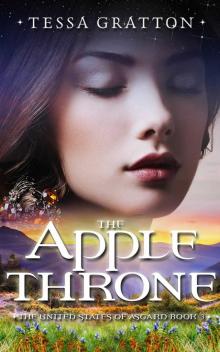 The Apple Throne
The Apple Throne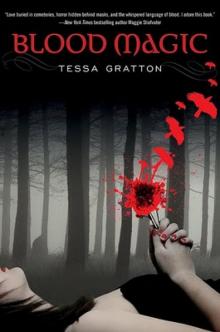 Blood Magic
Blood Magic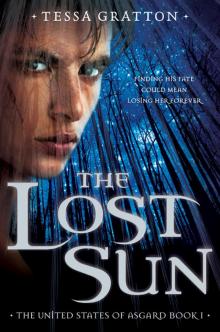 The Lost Sun
The Lost Sun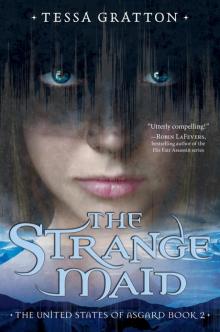 The Strange Maid
The Strange Maid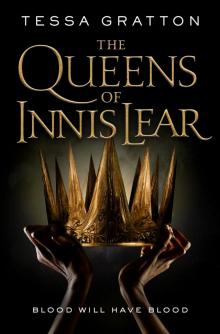 The Queens of Innis Lear
The Queens of Innis Lear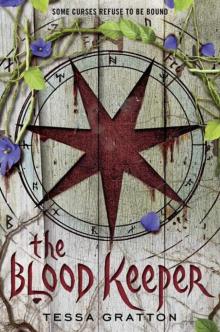 The Blood Keeper
The Blood Keeper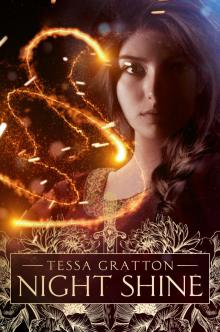 Night Shine
Night Shine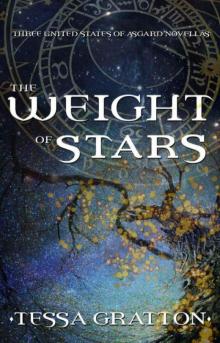 The Weight of Stars
The Weight of Stars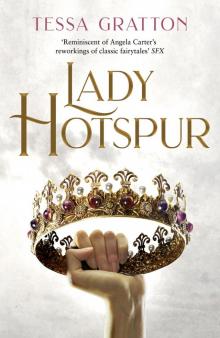 Lady Hotspur
Lady Hotspur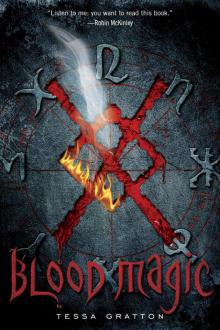 Blood Magic (The Blood Journals)
Blood Magic (The Blood Journals)